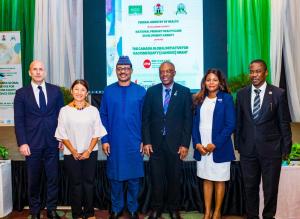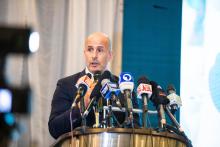Nigerians in situation of vulnerability to benefit from COVID-19 vaccination scale-up and integration through Canadian grant
Abuja, 20 July, 2023 - Aimed at scaling up COVID-19 vaccine service delivery amongst higher priority risk groups and strengthening health systems in the country, the Government of Nigeria in collaboration with the World Health Organization (WHO), and partners have launched the Canada Global Initiative for Vaccine Equity (CanGIVE) Grant.
The CanGIVE grant is a two-year grant of $9,261,920 (CAD) from Global Affairs Canada to WHO to improve COVID-19 vaccine delivery and integrate vaccination into routine health services in Nigeria.
This Project is part of Canada’s signature Global Initiative for Vaccine Equity (CanGIVE) which aims to support country-led efforts to enhance COVID-19 vaccine delivery among high-risk priority groups, strengthen health systems and increase regional vaccine manufacturing capacity.
Delivering his goodwill message at a launch event on 19 July, the Canadian High Commissioner to Nigeria, Mr Jamie Christoff said the project is another example of the Canadian historical institutional relationship with WHO to support Nigeria in the critical work of preventing disease and protecting those most at risk.
Appreciating WHO for its leadership throughout the COVID-19 pandemic, he said the Canadian government is delighted to be partnering with the WHO in support of the Federal Ministry of Health of Nigeria through CanGIVE.
He explained that all countries have a role in this pandemic recovery and in the work needed to prepare for future diseases outbreak, strengthen health systems and regain lost ground on immunization.
“As a key pillar within the CanGIVE initiative, this WHO-led project in Nigeria will support the integration of COVID-19 vaccination into primary health care and community-based services, to also reach high-risk groups and respond to gendered barriers to access,” he said.
Speaking at the launch, the Executive Director, National Primary Health Care Development Agency, Dr Faisal Shuaib, said while Nigeria has made significant progress on COVID-19 vaccination, there is still work to do.
He explained that the COVID-19 vaccination program was launched in Nigeria on 5 March 2021, and with the support of the federal government, state governments, and partners including the WHO and Canadian government, over 75% of the target population of individuals aged 18 and above with at least one dose of the COVID-19 vaccine.
“Several states have primary series coverage below 70%, and booster doses account for just over 20% of vaccinations. Therefore, this grant targets states with lower coverage and aims to reach high-priority populations.
The grant, to be implemented through WHO, also contributes to strengthening health systems, addressing service delivery inequities and gender disparities at the sub-national level. We are confident that WHO will continue to support Nigeria's efforts to enhance vaccine delivery, distribution, and public confidence, as well as generate demand, he said.
Likewise, the Director General, Nigeria Centre for Disease Control, Dr Ifedayo Adetifa in his speech said the initiative signifies a powerful commitment to accessing vaccines to bridge the disparity and inequity the life-saving commodities.
In his remarks, the WHO Country Representative, Dr Walter Kazadi Mulombo said WHO and other partners collaborated with the Government through its Agency; NPHCDA and other local Non-Government Organizations (NGO) to work very hard to put the COVID-19 disease under control in Nigeria.
He explained that several strategies including SCALES 3.0 (SCALES is an acronym for Service delivery, Communication, Accountability, Logistics, Electronic management of immunization data and supportive supervision), integration of COVID-19 into routine immunization, have been employed to deliver the vaccine to target populations.
For the record, as of 17 July 2023, 77,285, 627 eligible persons in Nigeria have completed the primary series of COVID-19 vaccination, with, 87,838,137 persons receiving at least one dose of the vaccine and 16,011,524 of those who have completed the primary series have received a booster dose of the vaccine.
The grant enables the WHO Nigeria country office to provide technical support to strengthen health systems, especially, for data management and surveillance linked to the Transforming African Surveillance Systems (TASS) Flagship initiative, increase COVID-19 vaccine demand generation and uptake in an integrated mode with routine immunization and other PHC services. It will be focused on community engagement, within the context of addressing inequities in service delivery and disparities in gender at sub-national geographical locations.
The project will be implemented in 15 states with lower COVID-19 vaccination coverage in the general population and the vaccine uptake among priority populations such as health workers, persons with comorbidities, the elderly (persons 50 years and above), and persons living in humanitarian/security-compromised settings.
The implementing States are Benue, Kogi, Taraba, Katsina, Kebbi, Anambra, Ebonyi, Akwa Ibom, Bayelsa, Delta, Edo, Rivers, Lagos, Ogun and Ondo.
Technical Contacts:
Dr Okamura Mie; Email: okamuram [at] who.int (okamuram[at]who[dot]int)
Dr Koko Richard; Email: kokor [at] who.int (kokor[at]who[dot]int)

